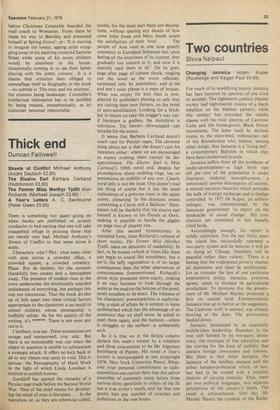Thick end
Duncan Fallowell
Streets of Conflict Michael Anthony (Andre Deutsch £2.95) The Elusive Earl Barbara Cartland (Hutchinson £3.50) The Former Miss Merthyr Tydfil Alun Richards (Michael Joseph £3.95) A Year's Letters A. C. Swinburne (Peter Owen £5.00)
There is something too queer going on when books are published so acutely conducive to bed-wetting that one will take misapplied refuge in praising those that are merely very bad. Michael Anthony's Streets of Conflict in that sense alone is acute.
Characters: who? Plot : what seeks what with eyes across a crowded office, a crowded square, a crowded cemetary. Place: Rio de Janiero, for the moment thankfully two oceans and a hemisphere away. The presence of student riots in the town underwrites the emotionally retarded melodrama of everything, but perhaps this was not intentional. That the book divides up or falls apart into these critical factors appropriate to the classroom is an insult to school children whose penmanship is ineffably saltier. As for the quality of the writing, it's ******. There is not even any sex in it.
I lambast, you say. These accusations are savage and unreasoned, you add. But there is no honourable way out when the object in question is unable to substantiate a strategic attack. It offers no kick back at all to any rheum one cares to void. This is serious: the Pornography of Hard Work in the light of which Linda Lovelace is entitled to publish forever.
Gurdjieff has quoted the remarks of a Persian sage made before the Second World War: 'One of the chief means for developing the mind of man is literature . . . In the narratives or, as they are otherwise called, novels, for the most part there are descriptions, without sparing any details of how some John Jones and Mary Smith attain the satisfaction of their 'love' . . The people of Asia were at one time greatly interested in European literature but, soon feeling all the emptiness of its content, they gradually lost interest in it, and now it is scarcely read there at all.' On he goes, page after page of culture shock, singling out the novel as the worst offender, surpassed only by journalism, and at the end one's solar plexus is a mess of bruises. What was empty for him then is now, abetted by publishers playing so safe they are cutting their own throats, on the brink of auto-annihilation. Looking for a brickbat in return we take the snigger's way out: if literature is godless, the Antichrist is television. The literati—downstaged—can breathe for the nonce.
It seems that Barbara Cartland doesn't much care for Persian sages. The cleverest thing about her is that she doesn't care for literature either: where we are encouraged to expect nothing there cannot be disappointment. The Elusive Earl is Miss Cartland's 169th novel and, despite her protestations about wedding rings, has no pretensions to nobility of any sort. Clearly royal jelly is not the issue. One doesn't read the thing of course but it has the usual indications of a grievous want in the upper storey, climaxing 'in the dramatic events concerning a Circus and a Balloon.' Hamleteers will be thankful that the elusive earl himself is known to his friends as Osric, making it possible to hurdle the giggles on page two of chapter one.
After this second hysterectomy in trampled form, Alun Richards's volume of short stories, The Former Miss Merthyr Tydfil, takes on delusions of readability. In fact, to be honest (which at times like these can begin to sound like moodiness, but it isn't), his taffy regionalism is of no larger consequence than the other aberrations of consciousness forementioned. Richards's prose style possesses more clarity, making it an easy business to look through the water at the mud on the bottom of the pond, seven pondlets to be exact. The triteness of his characters' preoccupations is asphyxiating, a state of affairs he is content to leave undisturbed which has the advantage of an assurance that we shall nevei be asked to meet them again, and the humour—where it struggles to the surface—is unbearably arch.
So it is that we in the fiction column declare this week's winner by a whiplash and three concussions to be Mr Algernon Swinburne of Putney. His novel A Year's Letters is unexpurgated at last (copyright 1974: New York University Press). Whatever your personal commitment to sadomasochism one cannot deny that this adroit ensemble of extremely camp letters from various dotty gentilities to others of the ilk has a true writer's touch, and for that one grants him any number of twitches and pollutions in the wee hours.


































 Previous page
Previous page